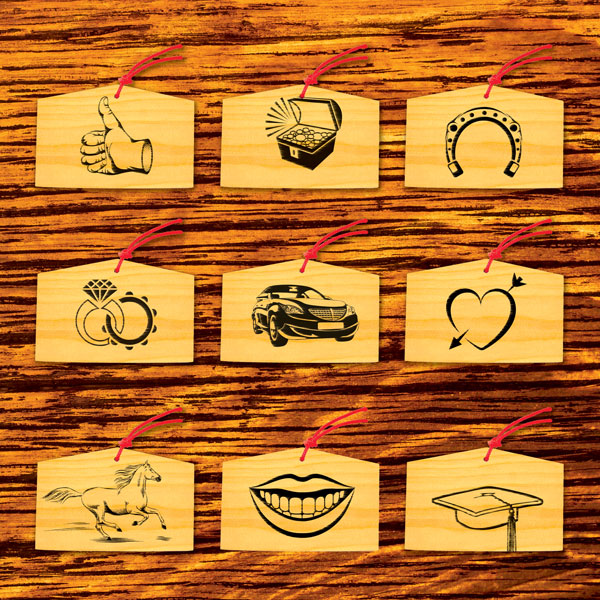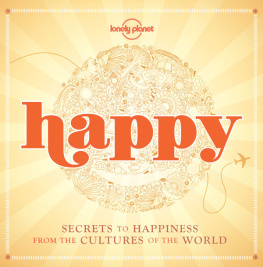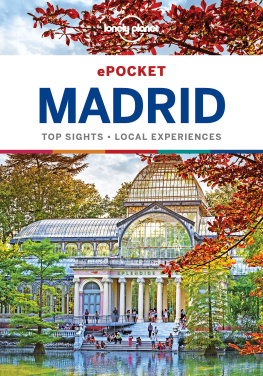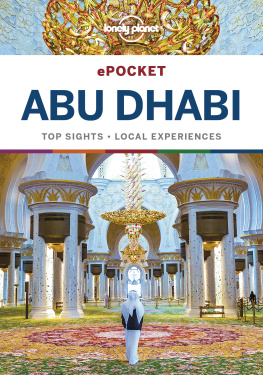

SECRETS TO HAPPINESS
FROM THE CULTURES OF THE WORLD

THE SECRETS


HAPPINESS & TRAVEL
Foreword by Maureen Wheeler, Lonely Planet Co-Founder

There is a famous story about two children who set out to find a bluebird; they travel all over the world only to find it in their own backyard when they return home. The bluebird, of course, represents happiness and the moral of the story is that happiness is found when you stop looking for it. Travelling to find happiness is probably always doomed to failure, despite all those romantic movies which claim otherwise, because happiness comes in those moments when you are not consciously trying to be happy. The moments of sheer joy come when you forget yourself and focus on something other than your own feelings or desires or goals.
When you travel to another country where everything is unfamiliar, your awareness is heightened, you notice every little detail because you are trying to understand and make sense of everything that is going on around you. The person you are at home, in your own environment, becomes less important, less central to this new story, you are an observer and this sense of being an outsider intensifies your responses and emotions.
Travel takes you to places in the world that are heart-stoppingly beautiful, exposes you to scenes of horrific deprivation and challenges you to accept and understand that the world is composed of both. But the moments that remain with you, when you look back and remember your wanderings, are those moments when you simply allowed time to unfold. Watching a sun set or rise, wandering around a ruined city or ancient temple, meeting someone who is as curious about you as you are about them, exchanging impressions with other travellers these are all part of the everyday travel experience, and yet these everyday incidents will be the fragments that make up the whole journey, that stay with you and inform or change your perspective when you return to that other, real life.
The opportunity to look at another culture, to see the world from another viewpoint, to see yourself as someone foreign, is the adventure of travel. The freedom, the sense of possibilities, the absence of the routine mundanity of normal life, is the excitement of travel. But happiness in travel comes from the moments when you are aware how lucky you are to be in that place, at that time, and how wonderful the world is.
INTRODUCTION

HAPPINESS. One word, nine letters, roughly seven billion definitions, one for each person on the planet.
Researchers are learning a lot these days about the intersection between emotions and neuroscience. Everyones level of happiness is about 50% genetically determined (what the experts call your happiness set point), a further mere 10% comes from external factors, and the rest comes from how we perceive our circumstances. Yes, money buys us some happiness, they say, but only to the point where we have security a roof over our heads, a doctor when were sick, a bit of entertainment now and then. Travellers take note: almost a dozen recent studies agree that experiences bring more long-term happiness than do possessions.
So, if were so smart about happiness, why isnt everyone on the planet who has reached this level of security perfectly happy? Across the developed world, people have better medical care, fewer preventable diseases and longer life spans than ever before. In the United States, the pursuit of happiness is a constitutional right. But while many Western countries top the lists of overall happiest countries, many also rank highest in individual rates of depression and other mental health disorders.
The same researchers who study happiness will tell us its not the flashy car or the new shoes that will make us happy in the long run. In fact, those expectations do us a disservice. Instead, theyve found that its some of the most basic aspects of life found in every culture that bring us the most joy connection, mindfulness, gratitude, play.
While this book offers a few specific examples, these experiences happen all over the world in billions of ways: devoting time to honour family ties (: Crop Over festival, Barbados).
One of the unspoken gifts of travel is it allows us the chance to open our mind, eyes and soul to how different cultures invite happiness into their lives, whether those countries are some of the wealthiest in history (: hygge in Denmark), or are struggling to put food on the table (p000: dressing up in Mali).
).
So, does Lonely Planet aim to be the authority on world happiness? Heck no. Were still working on it ourselves. We know there are around seven billion ways to define happiness, but here are 55 we just happen to like. They range from physical pleasures like dancing in the Carnaval parades in Brazil ().
Experiencing other cultures can remind us just how much we appreciate taking the time to breathe deeply or laugh with family and friends. Many of us have heard of the Japanese tea ceremony, but did you know about its worldaway counterpart, the Ethiopian coffee ceremony ()? Like its Japanese cousin, the Ethiopian custom reminds us to stop and smell the coffee beans and enjoy time spent together.
Like zakat in Islamic countries or jimba in Buddhist lands, the tiny island nation of Tokelau in the South Pacific has a ritual of inati ().
When you arrive back at home, perhaps your life has changed ever so slightly. Maybe after a visit to Italy you take a 15-minute stroll before dinner every now and again. Perhaps you invite a friend over for coffee and just talk and laugh for hours, productivity be damned. Or, who knows, you might now start your mornings dancing naked in front of your cat to that calypso music you picked up in the Caribbean. But your eyes are now open and theres no going back, only passing on what youve learned.

MIND

IF YOU DONT KNOW WHERE
YOURE GOING, THATS WHERE
YOULL END UP

SECRET PUT DOWN IN WORDS WHAT YOU REALLY WANT
|

| Tradition Shinto ema (votive plaques)
Date Any time
Celebrated in Japan | 
|
Next page





















